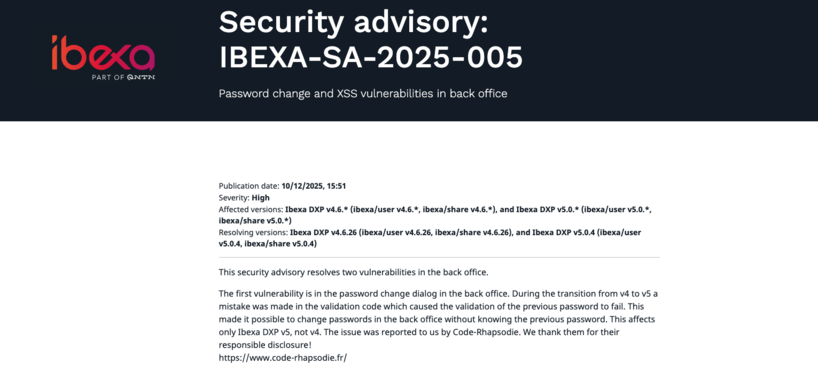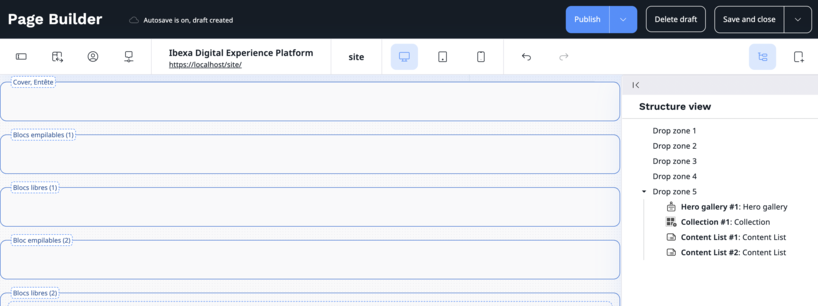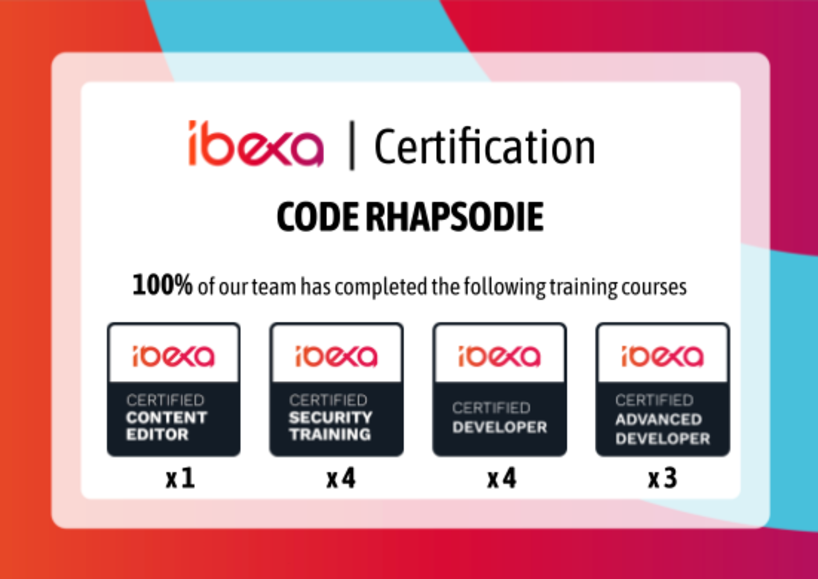Before Ibexa 3, a great way to inject variables into content view templates was to use eZCoreExtraBundle ParameterProvider. Now, with Ibexa 3, there is a way to do the same without the need for a third party bundle.
First example
As an example, let's write a VariableProvider that loads all contents from one relation list field of our viewed content. (example code for PHP 7.4+)
<?php
declare(strict_types=1);
namespace App\Provider;
use ArrayObject;
use eZ\Publish\API\Repository\ContentService;
use eZ\Publish\Core\FieldType\RelationList;
use eZ\Publish\Core\MVC\Symfony\View\ContentView;
use eZ\Publish\Core\MVC\Symfony\View\View;
use eZ\Publish\SPI\MVC\View\VariableProvider;
class RelatedVariableProvider implements VariableProvider
{
private ContentService $contentService;
public function __construct(ContentService $contentService)
{
$this->contentService = $contentService;
}
public function getIdentifier(): string
{
// Will be used in config
return 'related';
}
public function getTwigVariables(View $view, array $options = []): object
{
/** @var ContentView $view */
$content = $view->getContent();
/** @var RelationList\Value $value */
$value = $content->getFieldValue('media');
// Return value is typed object, so we simple use ArrayObject
return new ArrayObject(array_map(
fn (int $contentId) => $this->contentService->loadContent($contentId),
$value->destinationContentIds
));
}
}
Now, let's add it in our view configuration:
ezplatform:
system:
default:
content_view:
full:
article:
template: "@ezdesign/content/full/article.html.twig"
match:
Identifier\ContentType: article
params:
# Calling the VariableProvider is done by the ExpressionLanguage
medias: '@=twig_variable_provider("related")'
Going further
Ok, but what if I want to choose the field identifier? Sadly, unlike ParameterProvider, it's not possible to pass options directly (twig_variable_provider accepts only one argument: the provider identifier). But, since the VariableProvider is called through the ExpressionLanguage, we can call a method on the VariableProvider return value, with any argument we want.
Let's change our VariableProvider a bit:
<?php
declare(strict_types=1);
namespace App\Provider;
use eZ\Publish\API\Repository\ContentService;
use eZ\Publish\Core\FieldType\RelationList;
use eZ\Publish\Core\MVC\Symfony\View\ContentView;
use eZ\Publish\Core\MVC\Symfony\View\View;
use eZ\Publish\SPI\MVC\View\VariableProvider;
class RelatedVariableProvider implements VariableProvider
{
private ContentService $contentService;
public function __construct(ContentService $contentService)
{
$this->contentService = $contentService;
}
public function getIdentifier(): string
{
return 'related';
}
public function getTwigVariables(View $view, array $options = []): object
{
return $this;
}
public function load(View $view, string $fieldIdentifier): array
{
/** @var ContentView $view */
$content = $view->getContent();
/** @var RelationList\Value $value */
$value = $content->getFieldValue($fieldIdentifier);
return array_map(
fn(int $contentId) => $this->contentService->loadContent($contentId),
$value->destinationContentIds
);
}
}
The getTwigVariables method will simply return the provider itself, so we can call any method on it in the expression.
Let's change our view configuration accordingly:
ezplatform:
system:
default:
content_view:
full:
article:
template: "@ezdesign/content/full/article.html.twig"
match: Identifier\ContentType: article
params:
# Calling the VariableProvider is done by the ExpressionLanguage
medias: '@=twig_variable_provider("related").load(view, "media")'
Migrating from eZCoreExtraBundle ParameterProvider
Let's see what our example would look like as a ParameterProvider, and list the differences:
<?php
declare(strict_types=1);
namespace App\Provider;
use eZ\Publish\API\Repository\ContentService;
use eZ\Publish\Core\FieldType\RelationList;
use eZ\Publish\Core\MVC\Symfony\View\ContentView;
use Lolautruche\EzCoreExtraBundle\View\ConfigurableView;
use Lolautruche\EzCoreExtraBundle\View\ViewParameterProviderInterface;
class RelatedParameterProvider implements ViewParameterProviderInterface
{
private ContentService $contentService;
public function __construct(ContentService $contentService)
{
$this->contentService = $contentService;
}
public function getViewParameters(ConfigurableView $view, array $options = [])
{
/** @var ContentView $view */
$content = $view->getContent();
/** @var RelationList\Value $value */
$value = $content->getFieldValue($options['field_identifier']);
return array_map(
fn(int $contentId) => $this->contentService->loadContent($contentId),
$value->destinationContentIds
);
}
}
The view configuration:
ezplatform:
system:
default:
content_view:
full:
article:
template: "@ezdesign/content/full/article.html.twig"
match: Identifier\ContentType: article
params:
medias:
provider: related
options:
field_identifier: media
And the service configuration (assuming autowiring and autoconfiguration are enabled):
services:
App\Provider\RelatedParameterProvider:
tags:
- { name: "ez_core_extra.view_parameter_provider", alias: "related" }
To migrate that ParameterProvider:
- remove the service configuration, as the tag is handled by autoconfiguration
- replace ViewParameterProviderInterface by VariableProvider
- add getIdentifier method
- add getTwigVariables method that simply return $this
- optionnaly change getViewParameters method name or signature to better suit your needs
- change the view configuration
Nos derniers articles

Ibexa announces the release of a new LTS version with contributions from Code Rhapsodie
Ibexa published a security advisory and subsequently released new versions of Ibexa DXP v4.6.26 and ...


Is the naming of Ibexa DXP Page Builder zones suitable for contributors?
Is the suitability of the names given to the different zones in the Ibexa DXP ...


Connecteur Google Gemini pour les actions IA d'Ibexa
Connaissez-vous les Actions IA (AI Actions) d'Ibexa ? Les AI Actions, sont une solution extensible ...


Notre équipe est certifiée à 100% Ibexa
Experts Ibexa de longue date, forts de nombreux projets réussis sur Ibexa, eZ Publish et ...


Profitez d'une certification gratuite lors de l'Ibexa Summit 2025
La conférence annuelle Ibexa se tiendra les 30 et 31 janvier 2025 à Barcelone et ...


Migrate passwords from eZ Platform 2.5 to Ibexa 4.6
Data security, and in particular the security of user passwords, is an absolute priority for ...


✨🎄Code Rhapsodie vous souhaite le meilleur en 2025 🥂🍾🎊
2024 aura été une année riche en tempêtes, avec ses hauts et ses bas. Mais ...


Structure the code of your import/export processes with Dataflow
To celebrate the release of Dataflow 5 for Symfony 7, here is some feedback on ...


Gagnez un audit de votre application !
🎯 Nous relevons le défi de lancer un grand concours : Vous faire gagner un ...


Ibexa announces the release of a new LTS version with contributions from Code Rhapsodie
Ibexa published a security advisory and subsequently released new versions of Ibexa DXP v4.6.26 and ...


Is the naming of Ibexa DXP Page Builder zones suitable for contributors?
Is the suitability of the names given to the different zones in the Ibexa DXP ...

Connecteur Google Gemini pour les actions IA d'Ibexa
Connaissez-vous les Actions IA (AI Actions) d'Ibexa ? Les AI Actions, sont une solution extensible ...


Notre équipe est certifiée à 100% Ibexa
Experts Ibexa de longue date, forts de nombreux projets réussis sur Ibexa, eZ Publish et ...


Profitez d'une certification gratuite lors de l'Ibexa Summit 2025
La conférence annuelle Ibexa se tiendra les 30 et 31 janvier 2025 à Barcelone et ...


Migrate passwords from eZ Platform 2.5 to Ibexa 4.6
Data security, and in particular the security of user passwords, is an absolute priority for ...


✨🎄Code Rhapsodie vous souhaite le meilleur en 2025 🥂🍾🎊
2024 aura été une année riche en tempêtes, avec ses hauts et ses bas. Mais ...


Structure the code of your import/export processes with Dataflow
To celebrate the release of Dataflow 5 for Symfony 7, here is some feedback on ...


Gagnez un audit de votre application !
🎯 Nous relevons le défi de lancer un grand concours : Vous faire gagner un ...




